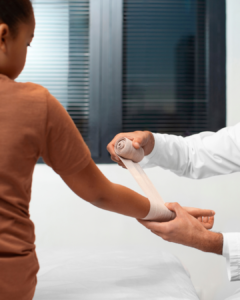What To Do After A Car Accident: Protecting Your Health And Legal Rights
Car accidents happen suddenly and can leave you in shock. Whether it’s a minor fender-bender or a major crash, the moments afterward are critical for both your physical health and your legal protection. Many accident victims overlook important steps that can later affect their recovery or insurance claim. At Specialty Care Clinics, we provide not only expert medical treatment but also guidance to ensure you take the right steps after an accident.

Below is a complete guide on what you should do immediately after a car accident:
1. Prioritize Safety And Call For Help
The first priority after a crash is safety. Move your vehicle to a safe location if possible, turn on hazard lights, and check for injuries. Always call emergency services — even if the accident seems small. A police report provides official documentation, which may be critical for insurance and legal purposes later.
If someone is seriously injured, do not attempt to move them unless there is immediate danger. Wait for trained emergency responders.
2. Seek Immediate Medical Attention
Never underestimate your injuries. Many accident-related conditions, such as soft tissue injuries, internal bleeding, or spinal cord injuries, may not show symptoms right away.
Even if you feel fine, schedule a medical evaluation as soon as possible. At Specialty Care Clinics, we specialize in detecting hidden injuries using advanced diagnostic tools. Early treatment prevents complications and ensures a smoother recovery.
3. Document The Accident Scene
Gathering evidence is one of the most important steps you can take. Use your phone to capture:
- Photos of vehicle damage from multiple angles
- Road and weather conditions
- Skid marks, traffic signals, or hazards near the scene
- Close-up photos of visible injuries
- Driver’s license, insurance, and contact information of all parties involved
This evidence strengthens your insurance claim and may protect you if disputes arise about fault.
4. Watch For Delayed Symptoms
Injuries after car accidents are often delayed. Conditions like head injuries, whiplash, concussions, or internal bleeding can develop over hours or even days.
Be alert for warning signs such as:
- Persistent headaches
- Neck stiffness or back pain
- Dizziness or blurred vision
- Numbness or tingling in limbs
- Unusual fatigue or confusion
If you notice these symptoms, seek immediate care from a medical professional.
5. Protect Your Legal Rights
What you say and do after an accident can impact your legal rights. Avoid admitting fault or apologizing at the scene, as this can be misinterpreted later. Instead, stick to factual statements with police and insurance representatives.
Keep a detailed file that includes:
- Medical bills and treatment records
- Police reports and accident documentation
- Witness statements and contact information
- Receipts for vehicle repairs or out-of-pocket costs
If your injuries are severe, consider speaking with a personal injury attorney. They can help you recover compensation for medical expenses, lost wages, and long-term care.
6. Begin Treatment And Rehabilitation
The road to recovery often requires more than just an initial doctor’s visit. Many car accident injuries — such as back injuries, knee injuries, or hand and wrist injuries — need long-term care and rehabilitation.
At Specialty Care Clinics, we offer:
- Comprehensive medical evaluations
- Pain management strategies
- Chiropractic and orthopedic care
- Physical therapy and rehabilitation programs
- Neurological and mobility support
Our team works closely with patients to create customized treatment plans that not only heal injuries but also restore strength and function.
7. Take Care Of Emotional And Mental Health
Car accidents can also cause psychological trauma such as anxiety, PTSD, or depression. Many victims struggle with fear of driving again or difficulty sleeping. Seeking emotional support, therapy, or counseling can be just as important as physical treatment.
At Specialty Care Clinics, we understand that true recovery includes both body and mind.
Conclusion
A car accident can turn your life upside down in seconds. But by taking the right steps — prioritizing safety, seeking medical care, documenting evidence, and protecting your legal rights — you can reduce long-term consequences. At Specialty Care Clinics, we are here to guide you through every step of recovery, from emergency treatment to rehabilitation and emotional support.
Concerned After A Car Accident?
Visit: Specialty Care Clinics – Auto Injury
Call: (972) 865-4454
Frequently Asked Questions (FAQs)
- Should I See A Doctor If I Feel Fine After A Car Accident?
Yes. Hidden injuries like whiplash or internal bleeding may not show symptoms right away. Early care is essential. - How Soon Should I Report The Accident?
Immediately. Notify local police and your insurance provider within 24 hours. - What If My Symptoms Appear Days Later?
Seek medical attention right away. Delayed symptoms are common in head, spinal, and internal injuries. - Can I Choose My Own Doctor After An Accident?
Yes. You are free to select your healthcare provider. Specialty Care Clinics specializes in auto injury care. - How Can Specialty Care Clinics Help Me Recover?
We provide expert diagnosis, treatment, rehabilitation, and long-term care for accident victims, helping restore health and quality of life.
